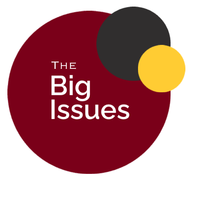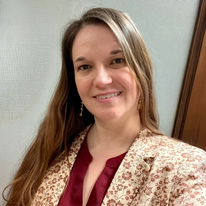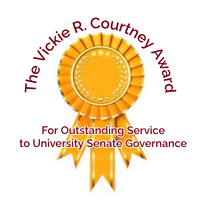
A Message from the Chair
Professor Mark Bee, chair, Senate/Faculty Consultative Committees
It’s that time of year again, when many of us welcome the end of another 15-week journey through the ups and downs of life in the academy. I’m writing in my role as chair of the Senate Consultative Committee (SCC) and Faculty Consultative Committee (FCC) – the executive committees of the University Senate and Faculty Senate, respectively – to provide a brief update on some of the issues we’ve been working on this fall. For the SCC and FCC, it’s been a semester of Pay, Presidents, and Policy.
Pay. The Workforce Reinvestment Resolution, which the University Senate passed unanimously in April of this year, continues to be that body’s top priority. Those of us involved with drafting the resolution heard from our constituents that we should “Go Big or Go Home!” We decided to Go Big. The administration is working on its response, which is expected in the spring semester. We hope they Go Big too. I am grateful to the administration for enlisting three senators – Colleen Flaherty Manchester, Adolfo Carrillo Cabello, and Charles Rank – to advise on the administration’s response. If you have not read through the resolution, I would encourage you to do so. It is a call for reinvestment by the U and the State in the institution’s “human capital,” its nearly 27,000 employees who deliver on our mission to the benefit of our students, the State, and the rest of the world. The resolution is organized around four “people centric” principles, the first of which calls on the University to provide its employees with “livable, equitable, and competitive pay.” In support of this principle, the FCC released in November a comprehensive report, Driven to Recover: An FCC Report on the Competitiveness of Faculty Compensation (view the video abstract | download the full report). This report takes a data-driven approach to answer the question: how competitive are our faculty salaries relative to peer institutions? Few faculty will be surprised to learn that our salaries lag behind our peers, but they might be surprised to learn by just how much we’ve fallen behind and for how long the decline has been going on. The report postulates that declines in salaries for faculty (and other employees too!) have led to declines in key measures of institutional quality included in MPact 2025. The FCC hopes to partner with key stakeholders in the spring semester to begin work toward a long-term plan to reverse these declines. Check out the FCC report to learn more.
Presidents. As you know, the Board of Regents is searching for the U’s 18th President. The Presidential Search Advisory Committee (PSAC) is currently busy working to identify 2-4 lead candidates who it will recommend to the Board of Regents for their consideration. The SCC met with members of the PSAC in October to provide input on the Presidential Profile and the qualities we should be seeking in our next president. I’m grateful both to the SCC members – Colleen Flaherty Manchester, Jenn Goodnough, and Matt Verkuillen – who were selected to serve on the PSAC and to the Board of Regents for selecting them. You can read more about this ongoing work below. While I’m on the topic of presidents, we were delighted that Interim President Ettinger dove straight into working with University Senate governance when he took over the helm in June. As he has stated publicly, the concept of shared governance was new to him, given his corporate background. But no one would have guessed that based on his level of engagement with senate leadership. For this we are grateful, and we look forward to another semester of his continued engagement.
Policies. I wouldn’t be describing the work of shared governance if I did not also mention the work various senate committees do in helping draft and review policies going through the consultation process. The SCC was consulted on changes to Board of Regents Policy: Equity, Diversity, Equal Opportunity, and Affirmative Action necessitated by the SCOTUS decision on affirmative action in college admissions. The SCC was also consulted as part of the comprehensive review of the U’s Administrative Policy on Responsible and Ethical Conduct of Research Education, and the FCC was consulted on the U’s new policy on Minnesota Earned Sick and Safe Time, which will take effect January 1, 2024, in response to a new Minnesota law. While not strictly policy, the FCC also consulted with the administration on a wide range of other topics, including discussions around changing the academic calendar, providing universal access to course materials, updates to the Regents Scholarship Policy (more on this below), changes to the core curriculum, and a proposal to create governance for non-credit education at the University of Minnesota. Stay tuned for more on these topics in the year ahead.
With that, I wish you a restful winter break and hope you find time to get outside, read a good book, and make a new friend.
The Big Issues

The work of the University and Faculty Senates is accomplished primarily through their standing committees and subcommittees. Faculty, students, academic professionals (P&A), civil service staff, and administrators have designated positions on most committees.
Regents Scholarship
The Regents Scholarship Program (RSP) administrative policy underwent a substantial consultation and review process over the past several months. Mary Rohman Kuhl, senior director, Total Rewards, Office of Human Resources (OHR), led the workgroup that drafted proposed amendments to the policy. Among the input considered during the review was a report titled Regents Scholarship - Summary of Access Barriers for P&A Employees, which was prepared during the 2022-23 academic year by then-chair of the P&A Consultative Committee, Adolfo Carrillo Cabello, along with members of the P&A Senate. While this report pointed out barriers to use of the scholarship specific to P&A employees, the consultation this fall reviewed the policy with all eligible University constituencies in mind.
This semester, representatives from the OHR, Academic Support Resources, and the University Tax Office consulted the proposed changes to the RSP with the Civil Service Consultative Committee, the Faculty Consultative Committee, the P&A Consultative Committee, and the University Senate. The proposed changes generally fall into four areas: improving accessibility to the program, simplifying the policy and process, trusting that employees will use the process correctly, and improving awareness of possible tax implications when using the RSP. There is also a recommendation to change the name of the program to the Regents Tuition Benefit Program or Employee Tuition Benefit Program, as the current title may lead some employees to think they would not be eligible.
At the December 8, 2023, Board of Regents (BOR) meeting, Whitney Taha Frakes, current chair of the P&A Consultative Committee, whose report centered around the importance of employee retention at the University, reinforced expanding the RSP as one of five points identified by P&A employees which could lead to increased employee engagement and higher retention levels.
Student Wellbeing
A number of University Senate Governance committees have been concerned with student wellbeing this semester. Colleen McDonald, assistant vice provost and chief medical officer, Boynton Health, and her staff have visited various groups this semester, including the Student Senate, the Senate Committee on Student Affairs, and the Equity, Access, and Diversity Committee, to share information on their initiatives to promote student health and wellbeing. One such initiative is the formation of a workgroup, led by Interim Mental Health Strategic Initiatives Director Kate Brekke, looking to improve access to services, streamline intake processes, and provide identity and cultural representation in care. Boynton also recently created the Basic Needs Strategic Plan, which used data to determine basic needs and found that food insecurity is a substantial and growing issue for students. Boynton staff are working in collaboration with the Student Basic Needs Working Group, which is a statewide effort organized by the Office of Higher Education. This working group will provide a report to the state legislature by September 1, 2024.
Tackling a different aspect of student wellbeing, the Disabilities Issues Committee continues work on a year-long project advancing a resolution calling for a dedicated, full-time coordinator for services for students who are in recovery from substance misuse. In discussions in 2022, the committee identified a gap between students in active need of substance misuse or addiction treatment, which can qualify for accommodations under the Americans with Disabilities Act, and supporting students who are in recovery to maintain their sobriety. People in recovery benefit greatly from a community of peers, especially in the face of the many pressures and stressors of college life. A full-time, dedicated coordinator could build on the already established work being done by the student leaders of the Recovery on Campus (RoC program), as well as provide additional outreach and support. The resolution has been endorsed by the Social Concerns Committee, the Equity, Access, and Diversity Committee, and the Student Senate Consultative Committee. The resolution will go to the Senate Consultative Committee and the University Senate for discussion and a vote in spring 2024.
The Senate Committee on Information Technologies and the Senate Committee on Educational Policy (SCEP) heard from Senenge Andzenge, assistant vice provost and director of program design and innovation, Office of Distributed Learning, and chair of the Provost's Task Force on Privacy in Digital Learning Tools and Online Proctoring. This task force was convened at SCEP’s request in spring 2022, with the aim of addressing privacy and mental health concerns raised by students about Proctorio and other digital learning tools. The task force’s recommendations include guidelines around remote proctoring practices and ensuring that students are aware of their rights and options related to the use of such technologies.
Presidential Search
The Board of Regents is in the process of searching for the next president of the University of Minnesota. University Senate Governance has engaged in this effort in several ways since the beginning of the process:
- The Faculty Consultative Committee (FCC) sent letters to the Board of Regents (BOR) providing their input on the composition of the Presidential Search Advisory Committee (PSAC); and to the PSAC detailing several commitments that the FCC believes the 18th president of the University should demonstrate.
- Three members of the Senate Consultative Committee (SCC) were appointed to the PSAC: Matthew Verkuilen, chair of the Civil Service Consultative Committee; Jennifer Goodnough, vice chair of the SCC and FCC; and Colleen Flaherty Manchester, past chair of the SCC and FCC.
- The P&A Consultative Committee leadership sent a letter to the BOR regarding P&A involvement in the search.
- Members of the SCC attended a luncheon with members of the BOR on October 23, 2023. Regents and SCC members were dispersed across several round tables, allowing for informal conversation. Topics discussed included expectations, aspirations, and vision for the next presidency; challenges facing the University of Minnesota; how the University can enhance systemness; and competitive compensation and employee retention.
- The PSAC held listening sessions with the SCC and the Disabilities Issues Committee on October 25, 2023.
- PSAC Chair Regent Mary Davenport and Vice Chair Professor Chris Uggen met with Mark Bee, chair of the FCC and SCC.
The search committee is now in the process of finding and vetting candidates. The PSAC will recommend two to four candidates to the Regents, who will name finalists. Public interviews with finalists are anticipated for early spring semester.
A View from the Inside: Taking Care of [New] Business

Amber Bathke, senior senate associate, University Senate Office
Anyone paying attention to the goings on in University Senate governance this semester will likely have noticed a lot of activity under New Business. While New Business appears on every docket of the University and Faculty Senates, it is somewhat rare that there is any, which lends an air of excitement and sometimes intrigue to the proceedings. The aim of this article is to give people an idea of what happens behind the scenes when New Business arises.
It may be helpful, first, to explain how senate dockets are put together. University Senate Office staff keep track of senate committee initiatives, as well as requests for senate consultation and action on administrative initiatives and policies, and populate the dockets accordingly (in consultation with the chair of the Senate Consultative Committee [SCC] and the Faculty Consultative Committee [FCC]). Docket deadlines are posted on the University Senate calendar page; anyone wishing to put a topic on the agenda is normally in touch with the University Senate Office well in advance of those deadlines. However, there are sometimes occasions when, for whatever reason, an item of business does not make it onto the senate docket, and senators have the right to introduce such items under New Business during a meeting.
In order for New Business to be considered immediately, a motion must be made and seconded, and then ⅔ of those present and voting must vote in favor of immediate consideration. If that threshold is not met, University Senate Rules stipulate that the item will be referred to the SCC (or the FCC for the Faculty Senate) for consideration and presentation at the next senate meeting.
This semester, we had two pieces of New Business related to the heartbreaking situation in Israel and Gaza. A few days prior to the University Senate meeting on November 2, 2023, a group of faculty members from the Medical School notified the University Senate clerk that they intended to introduce a resolution under New Business. Upon hearing this news, the University Senate Office and senate leadership began preparing, including brushing up on parliamentary procedure related to New Business; crafting wording to aid the chair in guiding senators through the processes; and devising technological solutions to issues such as pro and con debate, multiple layers of amendments, and more.
At the meeting, the New Business was approved for immediate discussion. The resolution called for, among other things, the University to send medical supplies to the region and establish humanitarian corridors. The discussion that transpired was met with a few technological hiccups as we all did our best to follow procedure and maximize fairness in the Zoom environment. The University Senate Office staff had not received a draft of the resolution prior to the meeting and were therefore unable to distribute it in advance, but the resolution was shown on screen and linked in the Zoom chat. Even so, many senators commented that they did not feel comfortable voting on the resolution without having had adequate time to ruminate over it. Senators took issue with certain words, facts, and turns of phrase, as well as the overall process by which the resolution was presented. The meeting was already over time, with the Faculty Senate meeting still to come. A motion to extend debate failed to meet the ⅔ majority threshold, and the body proceeded to a vote on the actual resolution.
The resolution was ultimately not approved. We suspect this outcome resulted from a combination of factors, including inadequate time to consider and reach consensus on the wording of a resolution that touched upon a highly complex and emotionally charged topic around which there is considerable diversity of opinion. Although the resolution was not approved, Professor Mark Bee, in his role as SCC chair, wrote to the authors of the resolution after the meeting to offer suggestions on some possible next steps they could consider.
On November 28th, the University Senate Office received notification that a different group of senators—this time, a group of students—intended to introduce an article of New Business related to Israel and Gaza at the University Senate meeting on November 30th. The authors expressed a desire to meet with the University Senate Office for assistance, but the timeline was unfortunately too short to accommodate that meeting. University Senate Office staff and senate leadership again engaged in preparations related to New Business, attempting to improve upon the process that unfolded at the early November meeting, while maintaining fairness. The authors of the resolution engaged in a condensed iterative feedback process and made some changes in advance of the meeting. They also distributed the resolution to senators about 24 hours before the meeting.
When the motion to consider New Business was raised at the November 30th meeting, it failed to achieve the ⅔ majority needed for immediate consideration and was referred to the SCC for consideration. While senators’ reasons for voting not to consider the New Business immediately were doubtless varied and nuanced, it seems likely that a full agenda, combined with having just considered a similar last-minute piece of business at the previous meeting, may have led to a disinclination to vote in favor of the motion. Professor Bee has been in touch with the authors of the second resolution, again, to offer suggestions on some possible next steps they could consider. It remains to be seen whether the topic will resurface in some form at future senate meetings.
The violence and suffering in Israel and Palestine have left many feeling powerless, with a completely understandable desire to take some sort of action. But the reality is that some things—longstanding international conflicts being a prime example—are simply outside of the sphere of influence of the University Senate and even the president of the University. In circumstances like these, it can be helpful to take a step back and consider the goal of the legislative action. If the goal is to state the University Senate’s stance on the situation; to ensure that members of the University community affected by this conflict feel supported; or to denounce local bias incidents arising from it, that process looks a lot different, and it is worth the time it takes to consult widely to come to a consensus on what such a statement looks like.
University Senate Office staff are available to advise senators on how to move legislative action successfully through the governance system.
Welcome New University Senate Office Staff Members
The University Senate Office welcomed three new members to the "small but mighty" (as director Erin Heath likes to say) team this fall. Deena Barker comes to the University from Prime Health Services; John Lof from Grinnell College, and Jaclyn Adair moves from UMN's Office of the Vice Provost for Faculty and Academic Affairs.

Call for Nominations: Vickie R. Courtney Award for Outstanding Service to University Senate Governance

The Vickie R. Courtney Award for Outstanding Service to University Senate Governance recognizes faculty, students, and academic professional and administrative (P&A) and civil service staff systemwide who have made a significant impact on University Senate governance, have demonstrated a commitment to University Senate governance, and have served as an inspiration to others.
Award recipients will receive a one-time $1,000 stipend and an engraved plaque, and will be formally recognized at the University Senate meeting on April 25, 2024.
The deadline for submitting nominations to recognize individuals for their outstanding service to University Senate governance is Friday, March 1, 2024.
Please consider nominating a colleague who exemplifies the criteria. A complete description of the award and nomination requirements can be found on the Vickie R. Courtney Award for Outstanding Service to University Senate Governance webpage.
University Senate Governance Working 4 U
The University Senate and Senate Consultative Committee have general legislative authority over administrative matters concerning more than one campus or the University as a whole. In addition, each constituency (student, faculty, civil service, and P&A) has a separate senate, as well as an executive—or "consultative"—committee. Members of the consultative committees are elected to represent the respective bodies.